| Listing 1 - 8 of 8 |
Sort by
|
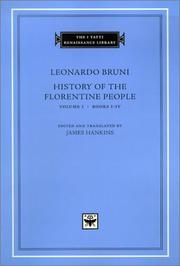
ISBN: 0674005066 0674010663 9780674016828 9780674005068 9780674010666 0674016823 Year: 2001 Volume: 3, 16, 27 Publisher: Cambridge, MA ; London Harvard University Press
Abstract | Keywords | Export | Availability | Bookmark
 Loading...
Loading...Choose an application
- Reference Manager
- EndNote
- RefWorks (Direct export to RefWorks)
Leonardo Bruni was famous in his day as a translator, orator, and historian, and was one of the best-selling authors of the 15th century. Bruni's 'History of the Florentine People' is generally considered the first modern work of history.
Florence (Italy) --- Florence (Italie) --- History --- Sources --- Histoire --- Jusqu'à 1421 --- Sources. --- História da itália. --- Bruni, Leonardo, --- To 1421. --- Italy
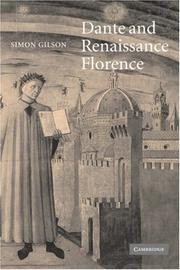
ISBN: 0521841658 Year: 2005 Volume: 56 Publisher: Cambridge New York Port Melbourne cambridge University Press
Abstract | Keywords | Export | Availability | Bookmark
 Loading...
Loading...Choose an application
- Reference Manager
- EndNote
- RefWorks (Direct export to RefWorks)
Simon Gilson examines Dante's reception in Florence in the fourteenth and fifteenth centuries, when Dante was represented, commemorated and debated in a variety of ways. Paying particular attention to Dante's influence on major authors such as Boccaccio and Petrarch, Italian humanism, and civic identity and popular culture in Florence, Gilson ranges across literature, philosophy and art, languages and social groups.
Dante Alighieri, --- Homes and haunts --- Florence (Italy) --- Florence (Italie) --- History --- Intellectual life --- Histoire --- Vie intellectuelle --- Dante Alighieri --- Italy --- Jusqu'à 1421 --- To 1500
Book
ISBN: 9782503523897 2503523897 Year: 2007 Volume: 12 Publisher: Turnhout: Brepols,
Abstract | Keywords | Export | Availability | Bookmark
 Loading...
Loading...Choose an application
- Reference Manager
- EndNote
- RefWorks (Direct export to RefWorks)
History of Italy --- anno 1400-1499 --- Florence --- Exile (Punishment) --- Bannissement --- History. --- Histoire --- Florence (Italy) --- Florence (Italie) --- Politics and government --- Administration --- Politique et gouvernement --- Exiles --- Citizenship --- History --- Italy --- To 1500 --- Jusqu'à 1421 --- 1421-1737 --- Exile (Punishment) - Italy - Florence - History - To 1500. --- Exiles - Italy - Florence - History - To 1500. --- Citizenship - Italy - Florence - History - To 1500. --- Florence (Italy) - Politics and government - To 1421. --- 14e siècle --- 15e siècle
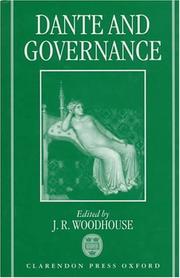
ISBN: 0198159110 0191673498 Year: 1997 Publisher: Oxford Clarendon Press
Abstract | Keywords | Export | Availability | Bookmark
 Loading...
Loading...Choose an application
- Reference Manager
- EndNote
- RefWorks (Direct export to RefWorks)
Politics in literature. --- Dante Alighieri, --- Political and social views. --- Italy --- Florence (Italy) --- Politics and government --- Dante Alighieri --- Political and social views --- Contemporary Italy --- 1268-1559 --- Jusqu'à 1421 --- Dante Alighieri, - 1265-1321 - Political and social views. --- Dante Alighieri, - 1265-1321 - Contemporary Italy. --- Florence (Italy) - Politics and government - To 1421.
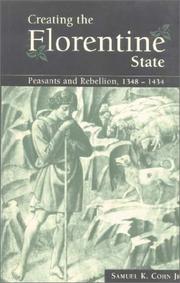
ISBN: 0521663377 0511003609 0521072921 0511118228 0511149352 0511309619 0511496443 1280154608 0511049234 1107118859 9780511003608 0511033990 9780511033995 9780511118227 9780521663373 9780511496448 9786610154609 6610154600 9780521072922 Year: 1999 Publisher: Cambridge Cambridge University Press
Abstract | Keywords | Export | Availability | Bookmark
 Loading...
Loading...Choose an application
- Reference Manager
- EndNote
- RefWorks (Direct export to RefWorks)
This book offers a comprehensive approach to the study of the political history of the Renaissance: its analysis of government is embedded in the context of geography and social conflict. Instead of the usual institutional history, it examines the Florentine state from the mountainous periphery - a periphery both of geography and class - where Florence met its most strenuous opposition to territorial incorporation. Yet, far from being acted upon, Florence's highlanders were instrumental in changing the attitudes of the Florentine ruling class: the city began to see its own self-interest as intertwined with that of its region and the welfare of its rural subjects at the beginning of the fifteenth century. Contemporaries either remained silent or purposely obscured the reasons for this change, which rested on widespread and successful peasant uprisings across the mountainous periphery of the Florentine state, hitherto unrecorded by historians.
Peasant uprisings. --- Peasant uprisings - Italy - Florence Region - Hist. --- Social change. --- Social conflict. --- Business & Economics --- Agricultural Economics --- Florence (Italy) --- Politics and government --- Peasant uprisings --- Social change --- Social conflict --- History. --- Arts and Humanities --- History --- Change, Social --- Cultural change --- Cultural transformation --- Societal change --- Socio-cultural change --- Class conflict --- Class struggle --- Conflict, Social --- Social tensions --- Peasants' uprisings --- Uprisings, Peasant --- Social history --- Social evolution --- Interpersonal conflict --- Social psychology --- Sociology --- Insurgency --- Revolutions --- Italy --- Florence Region --- Jusqu'à 1421 --- 1421-1737
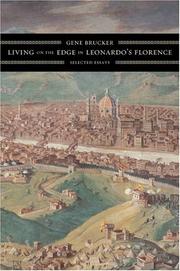
ISBN: 1282357484 0520930991 9786612357480 1597347205 9780520930995 9780520241343 0520241347 1417573708 9781417573707 6612357487 0520241347 9781597347204 9781282357488 Year: 2005 Publisher: Berkeley : University of California Press,
Abstract | Keywords | Export | Availability | Bookmark
 Loading...
Loading...Choose an application
- Reference Manager
- EndNote
- RefWorks (Direct export to RefWorks)
In Living on the Edge in Leonardo's Florence, an internationally renowned master of the historian's craft provides a splendid overview of Italian history from the Black Death to the rise of the Medici in 1434 and beyond into the early modern period. Gene Brucker explores those pivotal years in Florence and ranges over northern Italy, with forays into the histories of Genoa, Milan, and Venice. The ten essays, three of which have never before been published, exhibit Brucker's graceful intelligence, his command of the archival sources, and his ability to make history accessible to anyone interested in this place and period. Whether he is writing about a case in the criminal archives, about a citation from Machiavelli, or the concept of modernity, the result is the same: Brucker brings the pulse of the period alive. Five of these essays explore themes in the premodern period and delve into Italy's political, social, economic, religious, and cultural development. Among these pieces is a lucid, synoptic view of the Italian Renaissance. The last five essays focus more narrowly on Florentine topics, including a fascinating look at the dangers and anxieties that threatened Florence in the fifteenth century during Leonardo's time and a mini-biography of Alessandra Strozzi, whose letters to her exiled sons contain the evidence for her eventful life.
Renaissance --- Italy --- Florence (Italy) --- History --- Jusqu'à 1421 --- 1421-1737 --- 1268-1492 --- 15th century. --- alessandra strozzi. --- aristocracy. --- assassination. --- black death. --- campanilismo. --- christianity. --- court life. --- criminals. --- da vinci. --- europe. --- exile. --- fede. --- feudalism. --- fiducia. --- florence. --- genoa. --- government. --- hapsburg. --- historical women. --- history. --- italian history. --- italian renaissance. --- italy. --- letters. --- machiavelli. --- medici. --- medieval italy. --- milan. --- modernity. --- nation. --- national identity. --- nonfiction. --- northern italy. --- plague. --- poison. --- politics. --- religion. --- renaissance. --- spain. --- trust. --- urban italy. --- venice.
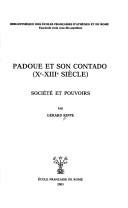
ISBN: 272830632X 282182050X 272831005X 9782728306329 Year: 2003 Volume: 317 Publisher: Publications de l’École française de Rome
Abstract | Keywords | Export | Availability | Bookmark
 Loading...
Loading...Choose an application
- Reference Manager
- EndNote
- RefWorks (Direct export to RefWorks)
L'ouvrage traite d’un objet classique – une cité et son contado – à l’aide des concepts mis au point par l’historiographie récente. Après avoir décrit le cadre territorial hérité de l’Antiquité et du haut Moyen Âge, elle analyse l’évolution de ce territoire et de ses institutions du Xe au XIIe siècle, notamment la naissance et la constitution d’une société féodale à laquelle s’intègrent même les « arimanni » , puis l’« incastellamento » et sa signification démographique et politique, enfin l’émergence de la commune et son évolution vers le podestariat. La seconde partie est dédiée aux campagnes, à l’évolution des rapports de production (notamment par le biais des contrats livellaires), enfin de l’économie rurale. La troisième partie est consacrée au XIIIe siècle, temps de crise : crise des fortunes nobiliaires, des communautés paysannes, des élites urbaines qui doivent intégrer les nouveaux riches. Politiquement, la crise aboutit à la domination d’Ezzelino da Romano (1237-1256). Le XIIIe siècle est « le temps des usuriers », qui se hissent au premier rang de la société ; les rapports de production se transforment (contrats agraires à durée limitée), le paysages aussi. On découvre ainsi les rythmes d’une société dans toute sa complexité.
Cities and towns, Medieval --- Urbanization --- Villes médiévales --- Urbanisation --- History --- Histoire --- Padua (Italy) --- Padoue (Italie) --- Rural conditions --- Conditions rurales --- Feudalism --- Regions & Countries - Europe --- History & Archaeology --- Italy --- Padua (Italy : Province) --- Politics and government. --- Rural conditions. --- Social conditions. --- Villes médiévales --- Medieval cities and towns --- Feudal tenure --- Cities and towns [Medieval ] --- Jusqu'à 1421 --- Civilization, Medieval --- Land tenure --- Land use --- Land use, Rural --- Chivalry --- Estates (Social orders) --- History. --- Padua (Province) --- Feudalism - Italy - Padua (Province) --- Cities and towns, Medieval - Italy - Padua (Province) --- Padoue --- Venise --- Padoue (italie ; région) --- Politique et gouvernement --- Moyen âge
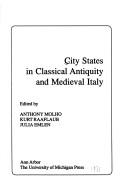
ISBN: 3515058737 9783515058735 Year: 1991 Publisher: Stuttgart: Steiner,
Abstract | Keywords | Export | Availability | Bookmark
 Loading...
Loading...Choose an application
- Reference Manager
- EndNote
- RefWorks (Direct export to RefWorks)
This comprehensive yet suggestive book offers innovative answers to familiar questions, as in the articles of David Whitehead and Erich Gruen on the nature and power of the citizen body. City-States also breaks new ground in its persuasive documentation of the ways in which seemingly disparate disciplines may profitably share methods and data Athens and Rome, Florence and Venice--the best known city-states in European history--have given Western culture a wealthy inheritance. Many of our basic notions about the nature and organization of towns come from realities born in antiquity and brought to fruition in the Middle Ages. While ancient city-states and medieval "communes" have had great importance for modern culture, much about the history of these institutions is still paradoxical and difficult to understand. The contributors to City-States in Classical Antiquity and Medieval Italy offer valuable insights into these problems. This volume presents a parallel reading of the history and analysis of the development, structures, and conflicts of both sets of cities, using insights gained from one to illuminate the other
City-states --- Cités-Etats --- Congresses --- Congrès --- Catholic Church. --- Athens (Greece) --- Florence (Italy) --- Rome --- Venice (Italy) --- Athènes (Grèce) --- Florence (Italie) --- Venise (Italie) --- History --- Histoire --- Cités-Etats --- Congrès --- Athènes (Grèce) --- Cities and towns, Medieval --- Cities and towns, Ancient --- Congresses. --- Cities and towns, Medieval - Italy - Congresses --- Cities and towns, Ancient - Congresses --- Athens (Greece) - History - Congresses --- Rome - History - Congresses --- Florence (Italy) - History - To 1421 - Congresses --- Venice (Italy) - History - 697-1508 - Congresses --- Athènes (Grèce) - Histoire - Congrès --- Rome - Histoire - Congrès --- Florence (Italie) - Histoire - Jusqu'à 1421 - Congrès --- Venise (Italie) - Histoire - 697-1508 - Congrès
| Listing 1 - 8 of 8 |
Sort by
|

 Search
Search Feedback
Feedback About UniCat
About UniCat  Help
Help News
News